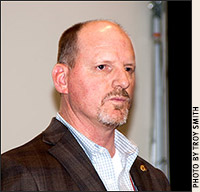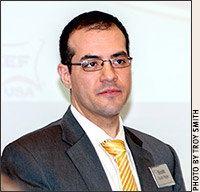Environmental Working Group
Working group discusses industry's relationship with the EPA.
SAN DIEGO, Calif. (Jan. 28, 2016) — With regard to the Environmental Protection Agency (EPA), the cattle industry finds itself in an awkward position — a quandary, you might say. Texan Tom McDonald said as much during a Jan. 28 meeting of the National Cattlemen’s Beef Association (NCBA) Environmental Working Group during the 2016 Cattle Industry Convention in San Diego, Calif.
 “We oppose the EPA on some things, but we need to work with them on others,” said Tom McDonald.
“We oppose the EPA on some things, but we need to work with them on others,” said Tom McDonald.“We oppose the EPA on some things, but we need to work with them on others,” said McDonald, who chairs the working group that finds itself standing between the cattle industry and what some cattlemen consider the most notorious of government agencies.
NCBA has come to blows with the EPA over the agency’s attempts to broaden its regulatory jurisdiction, under the Clean Water Act, by applying a far-reaching Waters of the United States (WOTUS) rule. Himself an EPA employee before joining the NCBA staff, Environmental Counsel Scott Yager brought members up to speed on related legislation and lawsuits. He noted how Congress had rejected the EPA’s proposed regulations, but President Obama vetoed the bill designed to halt WOTUS. Senate votes were insufficient to override the veto.
Yager explained how a coalition, including NCBA, brought suit claiming the rule exceeds EPA authority and the agency violated federal law while advocating for implementation of WOTUS. The courts are now trying to sort out where the case will be heard. Meanwhile, the U.S. Court of Appeals for the Sixth Circuit granted a nationwide stay requested by NCBA and other groups, which halts enforcement of the rule until the lawsuit is resolved.
 Environmental Counsel Scott Yager brought members up to speed on EPA-related legislation and lawsuits.
Environmental Counsel Scott Yager brought members up to speed on EPA-related legislation and lawsuits.“I think the case is likely to go all the way to the Supreme Court,” stated Yager. Asked if anything could happen during this election year, he replied, “No, it’s not likely.”
Yager cited other instances where the EPA is accused of over-exercising its regulatory muscle, explaining that NCBA is monitoring the action on all fronts. He said another reason to remain watchful is that EPA seems to be targeting livestock producers and is applying “enhanced enforcement” of rules applying to animal agriculture.
On the other hand, cattlemen within the working group think ongoing friction might be cooled if more EPA personnel could be made more familiar with actual agricultural practices. Iowa cattleman Dave Petty lamented missed opportunities for NCBA to work more closely with EPA during the agency’s rule-making processes.
“It’s better to make every effort to work with them during the process and provide input than to fight with them after the fact,” stated Petty. “We need to seek opportunities to offer potential solutions, instead of only criticism.”
Petty talked about his own experience in trying to build understanding with state and regional regulatory agency personnel, by bringing them to the country, including his own operation. He cited willingness among EPA employees to at least try to improve communication. Petty recommended that a similar approach be launched on a bigger scale, saying the changing of the guard that a new presidential administration may bring to agencies could be an opportunity to take that kind of action.
Editor’s Note: The articles used within this site represent a mixture of copyrights. This article was written by or under contract of the Angus Journal, an Angus Media publication. If you would like to reprint or repost the article, you must first request permission by contacting the editor at 816-383-5270; 3201 Frederick Ave., Saint Joseph, MO 64506. The Angus Journal claims copyright to this website as presented. We welcome educational venues and cattlemen to link to this site as a service to their audience.

